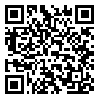Volume 22, Issue 3 (Autumn 2020)
Advances in Cognitive Sciences 2020, 22(3): 114-122 |
Back to browse issues page
1- Assistant Professor, Department of Psychology and Education of People with Special Needs, Faculty of Education and Psychology, University of Isfahan, Isfahan, Iran
2- PhD in Psychology and Education of Exceptional Children, Faculty of Psychology and Education, University of Tehran, Tehran, Iran
2- PhD in Psychology and Education of Exceptional Children, Faculty of Psychology and Education, University of Tehran, Tehran, Iran
Abstract: (2406 Views)
Introduction: The memory-based cognitive training program has special attention to cognitive ability and communication skills in deaf students. The present study aimed to determine the effect of the memory-based cognitive training on the cognitive ability and communication skills of deaf students.
Methods: This study was a semi-experimental kind with pre-test, post-test design, and control group. The participants included 26 female deaf students. Participants were selected by convenience sampling method from Mir deaf high school in Isfahan city. They were randomly divided into experimental and control groups, each group consisted of 13 students. The experimental group participated in a memory-based cognitive training program in ten sessions, but the control group did not participate in this program. The research instruments were the Wechsler intelligence scale for children (2003) and the Burton communication skills questionnaire (1990). Data were analyzed by MANCOVA.
Results: The results indicated that memory-based cognitive training had a significant effect on the cognitive ability and communication skills of students (P<0.0001).
Conclusion: According to the findings, a memory-based cognitive training program improved the cognitive ability and communication skills of deaf students. So, this program can be used to improve the cognitive ability and communication skills of these students and paying attention to the memory-based cognitive training program is effective and useful.
Methods: This study was a semi-experimental kind with pre-test, post-test design, and control group. The participants included 26 female deaf students. Participants were selected by convenience sampling method from Mir deaf high school in Isfahan city. They were randomly divided into experimental and control groups, each group consisted of 13 students. The experimental group participated in a memory-based cognitive training program in ten sessions, but the control group did not participate in this program. The research instruments were the Wechsler intelligence scale for children (2003) and the Burton communication skills questionnaire (1990). Data were analyzed by MANCOVA.
Results: The results indicated that memory-based cognitive training had a significant effect on the cognitive ability and communication skills of students (P<0.0001).
Conclusion: According to the findings, a memory-based cognitive training program improved the cognitive ability and communication skills of deaf students. So, this program can be used to improve the cognitive ability and communication skills of these students and paying attention to the memory-based cognitive training program is effective and useful.
Type of Study: Research |
Received: 2019/07/23 | Accepted: 2020/01/21 | Published: 2020/10/1
Received: 2019/07/23 | Accepted: 2020/01/21 | Published: 2020/10/1
| Rights and permissions | |
 |
This work is licensed under a Creative Commons Attribution-NonCommercial 4.0 International License. |





